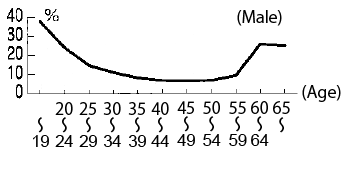It has been known that the unemployment rate is relatively high for young people, becomes lower for older people, and rises again at retirement age. This trend is universal, so why is the rate higher for young people?
This is because young people tend to change jobs more frequently than do older people. According to the Survey on Employment Trends by the Ministry of Health, Labour and Welfare, in 2012, the turnover rate for male workers was 14.8% overall, but the proportion was 37.8% for those aged 19 or younger, 24.1% for ages 20 to 24, and 14.7% for ages 25 to 29, showing higher figures for ages up to 24. Additionally, a separate survey by the Ministry reported that the turnover rates for middle school, high school, and university graduates in the three years from March 2009 (as the date of graduation) were 64.2%, 35.7%, and 28.8%, respectively.
Many point out that younger workers' tendency to leave their jobs quickly as a problem, but their behavior may not always be troublesome. Young workers still have a long working life ahead, so while their skills are still undeveloped, they can try different jobs until they find the right one. They can then settle into a particular job and stick with it for the rest of their working life. Such behavior is economically rational. You need to experience a job before you can judge whether or not it is suitable.
But there tends to be a period of unemployment between when people leave their present job and when they find a new one. That's why the unemployment rate tends to be higher among young workers than for older ones. And since periods of unemployment for young workers are while they are in transition between old and new jobs, they are typically shorter than those among the older age brackets.

* Translated by RIETI from the original Japanese "Yasashii Keizaigaku" column in the October 21, 2013 issue of Nihon Keizai Shimbun.


